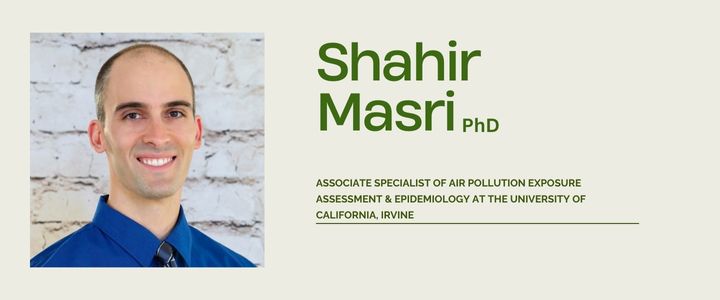Shahir Masri PhD

Dr. Shahir Masri is an Associate Specialist in air pollution exposure assessment and epidemiology at the University of California, Irvine, where he focuses on air pollution exposure modeling and climate change communication research. In addition to his role at UC Irvine, he is an adjunct faculty member at the Schmid College of Science and Technology at Chapman University, where he teaches courses on environmental health and pollution, and at National University, where he instructs online graduate and undergraduate science courses.
Education & Expertise
Dr. Masri earned both his Doctor of Science (ScD) and Master of Science degrees from the Department of Environmental Health at the Harvard School of Public Health. He completed his Bachelor of Science degree at the Institute of the Environment and Sustainability at the University of California, Los Angeles (UCLA).
Climate Advocacy & Public Engagement
In 2018, Dr. Masri founded “On the Road for Climate Action”, a national project aimed at raising awareness about climate change through educational events and public presentations across all 50 states. His outreach efforts focus on making climate science accessible and actionable for the public.
Writing & Research
Dr. Masri is the author of Beyond Debate: Answers to 50 Misconceptions on Climate Change, a book praised by the late Citizens’ Climate Lobby founder Marshall Saunders, as well as prominent scientists at MIT, UCLA, and other institutions. He has also written numerous opinion articles, which have been published in The Hill, the LA Times, Thrive Global, and other media outlets.
Currently, Dr. Masri is conducting research on:
✔ Exposure to harmful combustion-related air pollutants in the U.S. and internationally
✔ The presence of toxic chemicals in food, soil, and consumer products
He is the first author of over a dozen peer-reviewed scientific studies, published in leading academic journals. His work contributes to advancing environmental health research, public policy, and climate change communication.
